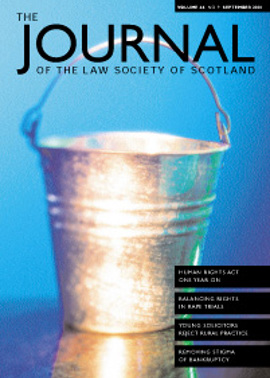Freedom to obtain medical services abroad
In two judgments delivered in July, the European Court of Justice considered the position of patients who go abroad for hospital treatment. The cases provoked much interest across the EU, with the governments of the majority of EU Member States submitting observations to the Court. It has been acknowledged that the decisions will have repercussions for the health service in the UK, particularly in relation to those waiting for treatment over an extended period of time.
Undue delay
In judgment C-157/99, the European Court of Justice considered two cases (Geraets-Smits and Peerbooms) referred from the Netherlands. The ruling related to the application of the EU principle of freedom to provide services to persons seeking hospital treatment abroad. In particular, does a requirement to seek prior authorisation for treatment constitute a barrier to the freedom to provide services?
Despite arguments put forward by EU governments to the effect that hospital services did not constitute an economic activity within the meaning of the EU Treaty – and thus the rule of freedom to provide services did not apply – the Court indicated that previous ECJ rulings that medical activity fell within the scope of article 60 of the Treaty should also apply to hospital care. The Court also judged that although a requirement of prior authorisation for hospital treatment did place a restriction on the freedom to provide services, that could be justified by overriding considerations relating to the stability of national social security systems and the maintenance of hospital services available to all. However, prior authorisation should not be arbitrarily withheld and can be refused only if the patient can receive the same or equally effective treatment without undue delay from an establishment with which the organisation paying for treatment (in this case, the sickness insurance fund) has made contractual arrangements.Payment for treatment
In a judgment given on the same day, the ECJ also considered the question of payment of costs for hospital treatment undergone in another Member State (case C-368/98 Vanbraekel). In this case a Belgian woman was incorrectly refused prior authorisation to receive hospital treatment in France. When authorisation was finally granted, after treatment had taken place and payment made by her to the hospital, the Court ruled that she was entitled to reimbursement of at least the same amount as she would have received if the treatment had taken place in Belgium, notwithstanding the fact that French rules would have resulted in her receiving a lower level of reimbursement. The Court’s decision was that, in general, the rules on assumption of costs are those applied in the State in which treatment is provided. However, the application of a rule which prevents a patient receiving the same level of reimbursement for treatment in another Member State as would have been received in their home State offends against the principle of freedom to provide services. As in the Geraets-Smits and Peerbooms cases, the risk of seriously undermining the workings of the social security system may constitute an overriding factor which is capable of justifying a barrier to freedom to provide services. However, the Court viewed it unreasonable to claim that payment of such additional reimbursement would entail a financial burden on the sickness insurance scheme of the State in which the patient was insured which would be capable of preventing the maintenance of treatment capacity or medical competence in that State.UK patients
The UK government has already acknowledged that the decision in the Geraets-Smits and Peerbooms cases will have implications for the NHS, where there is undue delay in treatment in the UK. It has announced that it will send patients abroad for treatment in an effort to cut waiting lists. Vanbraekel should also guarantee that any treatment carried out abroad will be on the basis of NHS cover, rather than the somewhat different systems of medical insurance which exist in other parts of the EU.
The texts of both judgments can be found at the European Court of Justice website: www.curia.eu.int.
In this issue
- President’s report
- Balancing rights of complainer and accused
- Young solicitors shun rural practice
- Ordinary rule of expenses doesn’t apply
- Pragmatic approach to voluntary arrangements
- Complicating culpable homicide
- Human Rights Act one year on
- Domain name disputes – all you need to know
- Loose ends can lead to claims
- Freedom to obtain medical services abroad
- Book reviews






